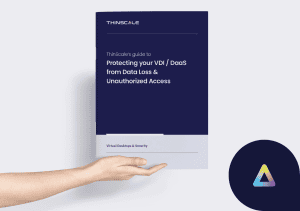Virtual workspace security is a growing concern for CX providers as more and more companies turn to remote and hybrid work models. With a virtual workspace, employees have access to sensitive information and company assets from anywhere, potentially exposing them to cyber-attacks and data breaches.
These incidents can result in significant financial losses, as well as damage to a company’s reputation and customer trust.
Implementing effective security measures can protect the sensitive information and assets of their clients. This not only helps to maintain the trust and reputation of the CX provider, but also ensures the integrity and confidentiality of client data.
Building a secure virtual workspace infrastructure
CX providers should implement a range of virtual workspace security measures to protect their clients and their own corporate assets. These may include:
Malware protection on the endpoint: Protecting the end-user’s actual device against malware such as screen-scrapers and keyloggers is essential, as the endpoint is often the most heavily attacked link in your IT security framework. ThinScale’s Application Execution Prevention feature protects devices against unauthorized programs such as these to run in the first instance.
Remote monitoring and updating: Ensuring that all devices across your entire estate, and the applications they run, are up to date at all times is challenging when managing a remote or hybrid workforce. ThinScale simplifies this by enabling you to monitor devices and installed software, and automatically push updates whenever available, with full visibility over which devices have and have not been updated.
Multi-factor authentication: MFA can help to prevent unauthorized access and protect sensitive information..
Encryption: CX providers should encrypt all data transmitted and stored including emails and files.
Virtual private networks (VPNs): VPNs can provide an additional layer of security. However, it’s important to understand however that VPNs only offer network protection, they are ineffective against malware that is already sitting on the actual device itself.
Firewalls: Firewalls can help to prevent unauthorized access to a company’s virtual workspace by blocking incoming traffic from potentially malicious sources. CX providers can implement firewalls to protect their virtual workspace and the sensitive information contained within. They should also have as few open ports as possible to reduce attack vectors.
ThinScale is the CX industry’s leading provider of Virtual Workspace Security software, protecting BYOD/untrusted and corporate devices in remote, on-site, and hybrid deployments.




